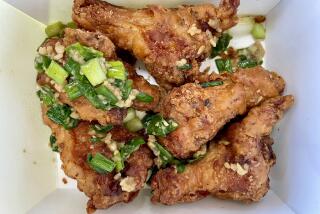Hanoi Brewery Adjusting to Turmoil : Economics: Subsidies have ceased, while competition has cut sales. The brewer pins its hopes on bottles, a new brand and outside help.
HANOI — The winds of reform are blowing through the Vietnamese economy, buffeting even such pillars of state enterprise as the venerable Hanoi Brewery.
Situated in an industrial suburb of the capital, the peeling beige factory is a relic of the colonial days, when beer was the exclusive preserve of French brew masters. The brewery was taken over by the communist regime in 1954, when the French left, and began a long slide into inefficiency.
As with most Vietnamese enterprises, the brewery’s financial world was turned upside down in 1986, when the Communist Party unveiled a reform program called doi moi , creating a free market, ending subsidies to state firms, devaluing the beleaguered Vietnamese currency and adopting “a socialist system of accounting,” meaning that companies were now expected to make a profit or they would be allowed to go bust.
The transition has been especially rough at the Hanoi Brewery, where the managing director at the time doi moi was announced committed suicide after charges of corruption were leveled. But factory officials now believe that he was falsely accused by workers afraid of his reformist ways.
Another storm that broke over the brewery came from Vietnam’s northern neighbor, China. With relations improving between the two communist governments, a flood of Chinese goods crossed the border. Faced with competition for the first time, a number of Vietnamese firms went to the wall.
The tide of goods from the north included Wanlipiju, a beer in a familiar green bottle. The Chinese beer was not only better tasting then Hanoi beer; it was cheaper.
Dinh Thi Lanh, deputy director of the Hanoi Brewery, acknowledges that sales collapsed, from 36 million liters in 1988 to 28.5 million in 1989. Lanh tries to put a brave face on the problem, blaming the reduction on a scarcity of raw materials rather than competition.
Originally, all of the brewery’s raw materials had to be imported from Czechoslovakia through government middlemen, Lanh said. Now, the factory can import these materials from Czechoslovakia on its own.
The beer’s flavor seems slightly soapy to the Western palate. And “it’s true that people rushed to try Chinese beer” at first, Lanh said. “But they prefer the taste of Vietnamese beer and have come back to us,” he added.
In addition to the Chinese, who cut prices by 20%, the Hanoi Brewery faced increased competition from breweries in southern Vietnam. One brewer has introduced a brand called “Bino,” which comes in an aluminum can and is described by a Western diplomat as a “very respectable beer.”
“We’re facing all kinds of competition,” Lanh said. “Productivity is still very low. We’re worried.”
The Hanoi Brewery dealt with last year’s sales crisis in a manner that seems more socialist than capitalist. It reduced its sales of beer in kegs and increased sales of bottled beer. Bottles, Lanh pointed out, are more labor-intensive, thus the work force was saved from any heavy cutbacks.
The brewery still does not know whether it makes a profit, because until last June the factory received a government subsidy, and management has not yet figured out whether it has reached the break-even point. But bottled-beer sales pushed gross revenue last year to $7.8 million (33 billion dong) from $6.4 million (27 billion dong) the year before.
Because the demand for beer is so great--one benefit of the economic changeover is that Vietnamese consumers now have more money to spend--the brewery can sell every bottle that it produces.
One way it is increasing revenue is by attempting to go up market. It has introduced a beer called Truc Bach, which is brewed 15 days longer than the Hanoi brand and has 2% more alcohol.
With sales so brisk, the factory does not have to worry about layoffs. Only four workers have been fired since dismissals became permissible last August. Lanh said the four had insulted customers.
According to Lanh, the factory wants to expand capacity but does not have the resources. It hopes to make a deal with a Western firm, perhaps a West German brewery, for long-range cooperation.
While such a deal may be in the offing, a Western economist noted that Vietnamese managers have begun to pin all their hopes on outside assistance, which has yet to materialize.
Also, the country faces a serious credit squeeze. To choke off inflation from 700% a year to the current 24%, banks raised interest rates sharply. While the rates have eased, it is still cripplingly expensive for a company to borrow.
Nonetheless, “things are really improving in a lot of state enterprises,” the economist said.
More to Read
Sign up for Essential California
The most important California stories and recommendations in your inbox every morning.
You may occasionally receive promotional content from the Los Angeles Times.










